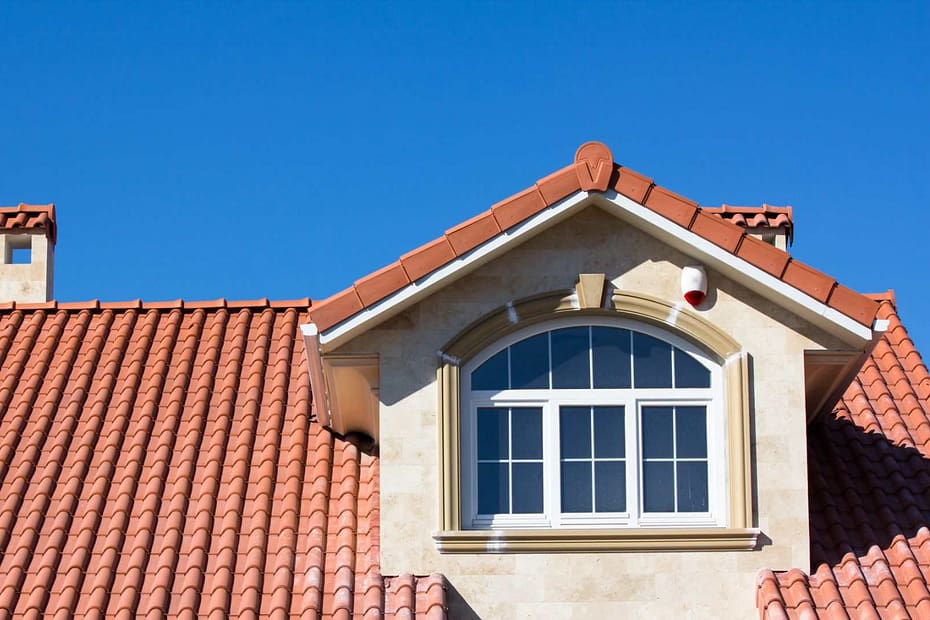If you’re considering putting a tile roof on your home, you should know that this beautiful type of roof is one of the most expensive – but longest lasting – roofs you can choose. Many people love the look of a tile roof, which tends to lend a Mediterranean vibe to any home. But once you learn the steep cost, it’s only natural to wonder, how long does a tile roof last?
What is a Tile Roof?
In the past, almost all tile roofs were made of terracotta, with its beautiful, signature orange color. Today’s tile roofs can be made of several different types of materials. But all types of tile roofs feature overlapping tiles that are fastened to batten boards on your roof. One important thing to note about a tile roof is that you’ll want to be sure to find a roofer with extensive experience installing tiles. It’s not a job for an amateur.
Below, we’ll discuss a few popular types of tile roofs.

Types of Tile Roofs
There are several different types of tile roofing material. While they’re similar in nature, each different type gives a home a slightly different look. For example, traditional clay or terracotta tiles lend a Mediterranean vibe, while slate tiles can give your home a stately, elegant look. Most tiles, regardless of type, come in sheets to make the installation process easier. Here are some of the different types of materials you can choose from.
- Clay. Traditional orange clay tiles are made of terracotta, a type of soft, clay-based ceramic. Clay tiles come in two shapes: rounded or flat. Regardless of the shape, clay tiles are the heaviest roofing material you can find, and require a very solid roofing structure underneath.
- Concrete. Concrete tiles have a similar shape as clay tiles, but they’re light gray instead of orange. These tiles tend to be slightly less heavy than clay tiles and they’re less expensive as well.
- Composite. These are a blend of synthetic materials that are made to resemble clay tiles. Despite their inauthenticity, they are less prone to breakage, which is a huge advantage. This makes them a bit more expensive than clay tiles.
- Slate. One of the most expensive roof types, slate tiles are simply gorgeous. They lend a decidedly European vibe to a home, and are considered a premium roofing material.
How Long Does a Tile Roof Last?
Most of these types of materials can last just about a lifetime: between 50 to 100 years is the industry expectation for the lifespan of a tile roof of any kind, be it clay, slate or concrete. This incredible durability is one of the biggest advantages. With the exception of direct damage from heavy objects (such as during a hurricane or tornado), there isn’t much that can harm a tile roof. If you’re looking to replace your existing roof with a tile roof, consider using a roof replacement cost calculator to get an estimate of how much you’ll pay for this type of material.

What are the Pros and Cons of a Tile Roof?
Before moving forward with the decision to install tiles on your roof, it’s a good idea to weigh the pros and cons of this type of roof.
Pros
Despite the high price tag, there are many advantages of a tile roof. We’ll take a look at a few below.
- Long lasting. A clay material roof can last between 50 and 100 years.
- Available in a variety of colors. Choosing a clay or composite roof allows you the option to choose from a bunch of different colors to match your home’s aesthetic.
- Durable. Clay tile shingles can withstand high winds, strong sunshine and constant moisture without breaking down.
- Low maintenance. Clay tile roofs can benefit from a routine cleaning every three to five years. Outside of that, no maintenance outside of regular inspections is required.
- Sustainable. Clay is a sustainable roofing option. They’re made from minerals mined from the earth rather than synthetic materials. And once they’re removed from your roof, they can be recycled.

Cons
Not sure if a clay tile roof is right for you? Consult a roofer before moving forward: they’ll be able to answer your questions and let you know if your home’s internal structure can support a clay tile roof. Here are a couple of drawbacks to consider if you’re thinking of installing a tile roof.
- Heavy. Clay shingles are one of the heaviest roofing materials. You’ll have to have a qualified professional inspect your roofing structure to ensure it can support a clay tile roof. Options like composite or concrete roof shingles are somewhat lighter than clay.
- Difficult to install. Like we mentioned above, it’s important to check that your roofer has experience installing a clay roof before moving forward. It’s not an easy installation, although purchasing sheets of tiles can help with this.
- Not suitable for all roof pitches. Another reason to consult with a qualified professional, it’s essential to know your roof’s pitch before moving forward. These roofs require a certain pitch in order to work, and shouldn’t be installed on flat or nearly flat roofs due to their heavy weight.
Find a Qualified Roofing Professional
Looking for someone to install a tile roof on your home? These heavy shingles can be difficult to install, since it needs a strong roofing structure, a certain pitch and a certain underlayment. That’s why it’s critical to find a qualified roofer. Before beginning the process, start by using a roofing calculator to get an estimate for the job.
Fact Checked by Christin Perry 6/14/2024
